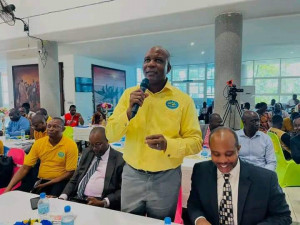By Amin Kef (Ranger)
NP (SL) Ltd continues to solidify its position as the leading petroleum company in Sierra Leone, renowned for providing top-tier petroleum products and setting the standard for customer care. With a strong emphasis on quality, efficiency, and technological innovation, NP (SL) Ltd has become a trusted and reliable supplier in the nation’s energy sector.
The company’s commitment to integrating cutting-edge technology has allowed NP (SL) Ltd to enhance its operations significantly. Modern tools such as the NP Smart Card, Global Positioning System (GPS), and Video Tracking System (VTS) have been implemented to streamline processes and ensure a seamless experience for consumers. Additionally, NP’s user-friendly fuel pumps have made fueling easier and more efficient, providing customers with the convenience they deserve.
The NP Smart Card is particularly notable, offering a hassle-free method for fuel purchases. Consumers can carry “fuel in their pockets,” allowing them to quickly access petroleum products on the go. This digital innovation underscores NP (SL) Ltd’s focus on customer satisfaction and accessibility, reinforcing its reputation for being “1st For Customer Care.”
Through rigorous planning and substantial investments in modern technology, NP (SL) Ltd has eliminated concerns about inaccurate measurements at its filling stations. All outlets use calibrated pumping machines, ensuring that customers receive exactly what they pay for—a transparent approach that has earned the company widespread praise. Social commentator Mohamed Bai Sesay recently lauded NP (SL) Ltd, calling it a leader in customer care and applauding its commitment to delivering honest, transparent services.
Moreover, NP (SL) Ltd’s contributions to local employment have further cemented its status as a pillar of national development. By exclusively hiring Sierra Leoneans, NP (SL) not only creates jobs but also empowers individuals, improving their standards of living and contributing to the country’s economic growth. As a 100% indigenous company, NP (SL) Ltd stands as a shining example of local ownership’s impact on fostering national pride and economic self-sufficiency.
NP (SL) Ltd’s portfolio also includes NP Gas, a product known for its environmental benefits and efficiency. This offering has gained significant traction in the market, further positioning NP as a forward-thinking company. Alongside this, the company’s expansion into neighboring countries like Guinea, Liberia, Ivory Coast, and The Gambia highlights its growing influence as a regional leader in the petroleum industry.
In a recent nationwide survey, NP (SL) Ltd’s customers overwhelmingly expressed their satisfaction with the company’s services. Many commended NP for consistently ensuring the availability of petrol, diesel, gas, and lubricants like Castrol, preventing the fuel shortages that could disrupt daily life. As Sierra Leone’s largest petroleum dealer, NP (SL) Ltd plays a crucial role in maintaining the country’s energy stability.
Beyond its contribution to energy security, NP (SL) Ltd is also recognized for its social and economic contributions. The company is a major taxpayer, significantly supporting the National Revenue Authority (NRA) and contributing to national development projects. Economists and business experts alike have praised NP (SL) Ltd for its commitment to the Local Content Policy, which emphasizes local employment and the optimization of homegrown resources.
NP (SL)’s innovative approach has been further demonstrated through the introduction of the Energy Pass Card, a next-generation smart card that provides real-time fuel balance updates and allows for seamless, offline fuel purchases. This move towards a cashless, digital fueling process has been well received by consumers and sets NP (SL) Ltd apart as an industry leader.
In every aspect, from innovation to customer care, NP (SL) Ltd exemplifies what it means to be a successful, indigenously-owned company. It continues to serve as a model for aspiring entrepreneurs, showcasing the transformative power of dedication to service excellence. As Sierra Leone’s number one petroleum dealer, NP (SL) Ltd remains committed to driving national development and improving the quality of life for its citizens.





















